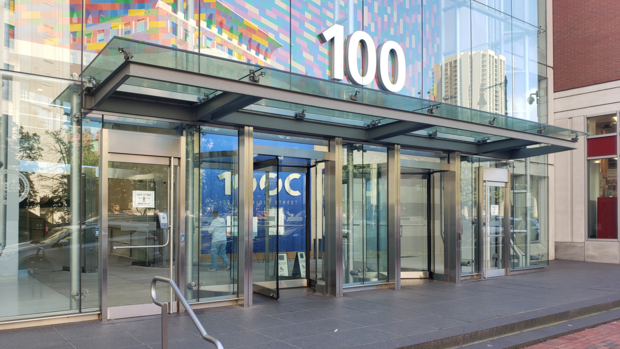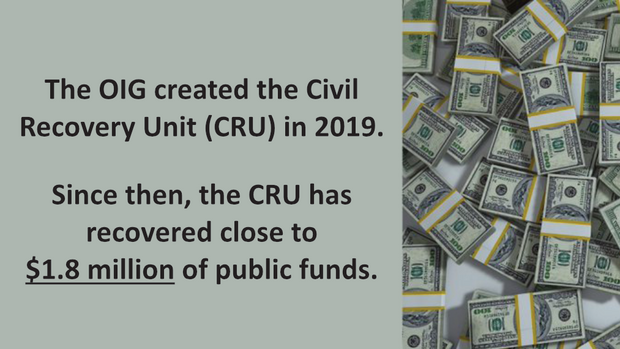Investigation Reveals Widespread Waste and Abuse of Public Funds by Municipal Treasurers
In 1982, the OIG received a complaint that municipal treasurers were wasting public funds by depositing money in noninterest-bearing bank accounts. The complainant further alleged that the treasurers obtained services from the banks in exchange for using these accounts, and these “compensating balance accounts” were circumventing local appropriations procedures. In response, the Office began a three-year investigation of municipal banking practices in Massachusetts, which culminated in a 113-page report released in 1985.
The OIG’s Report on Municipal Banking Relations revealed that municipal treasurers had indeed wasted millions of dollars through mismanagement of funds and the widespread practice of leaving money in bank accounts that paid little or no interest. Bank records from a sample of 31 cities and towns showed that treasurers left $27 million idle in zero-interest accounts in fiscal year 1983, and the data reported from jurisdictions throughout the Commonwealth mirrored the findings from the sample. The report estimated that in total, the state’s cities and towns wasted at least $6 million during fiscal year 1983 due to service cost premiums and holding money in noninterest-bearing accounts. The report identified an additional $5.38 million as highly vulnerable to waste because of poor account management practices in municipal treasury operations. The Office also found an absence of competition in banking service procurements, which inflated prices of services and further contributed to wasted funds.
During the investigation, the Office uncovered many instances in which public officials accepted illegal gratuities from banks. (Then, as now, state ethics law prohibited public officials from receiving gifts of “substantial value” – i.e., gifts valued at $50 or more – in connection with their official duties. See M.G.L. c. 268A, § 3.) From 1982 through 1984, seven Boston-based banks gave hundreds of gratuities, in the form of free meals and drinks, complimentary tickets to theater performances and sporting events, free rounds of golf and advantageous personal loans, worth approximately $138,000, to municipal treasurers and other public officials. During 1984 alone, 104 municipal treasurers (almost one-third of all treasurers) accepted gratuities of substantial value from one or more of the seven banks. One treasurer was even entertained by bank officers 303 times between August 1, 1982, and December 31, 1984.
The OIG concluded that these municipal banking practices obstructed accountability, promoted waste of public funds and invited widespread abuse of public office. The Office found that without additional safeguards in place, waste and impropriety in municipal banking relations would likely recur.
As a result of these findings, Inspector General Joseph Barresi filed a comprehensive procurement reform bill with the Legislature to require competitive procurement of municipal services. Barresi also recommended provisions that would ensure state monitoring of excess balances in zero-interest accounts and that would require treasurers to seek reasonable rates of return on municipal funds. These provisions became law in Chapter 740 of the Acts of 1985.
OIG Investigation Leads to $36.7 Million Settlement, Conviction of Former MWRA Financial Advisor
In the mid-1990s, the OIG conducted a multi-year investigation of the financial services industry, resulting in a $36.7 million settlement with two financial services firms and the federal conviction of former Massachusetts Water Resources Authority (MWRA) financial advisor Mark S. Ferber (Ferber) for taking kickbacks in connection with his advice to the MWRA and other public entities.
The investigation began in 1993 when the Office objected to the MWRA’s plan to transfer its $2.375 million financial advisory services contract from Lazard Freres & Co. (Lazard), Ferber’s former employer, to First Albany Corporation (FAC), his new one, without a competitive process.
The Office’s inquiry led to the revelation that Lazard had a side deal with Merrill Lynch, Pierce, Fenner & Smith Inc. (Merrill Lynch) that paid Lazard a $1 million annual retainer to market its financing services to Lazard’s government clients, including the MWRA. Under the agreement, which ran from 1990 to 1992, Merrill Lynch and Lazard also split more than $6 million in fees and commissions from financial transactions, including MWRA bond sales. In addition, the Office found $170,000 in payments from FAC to Lazard’s Boston office in the year and a half before Ferber switched firms.
After the OIG issued a report detailing these findings, other state and federal agencies, including the Massachusetts Attorney General’s Office, the U.S. Attorney’s Office, the Federal Bureau of Investigation, the Securities and Exchange Commission (SEC) and the U.S. Postal Service, launched their own investigations. In 1994, the SEC cited the OIG’s revelation of these undisclosed contracts when it strengthened its disclosure rules for agencies and companies involved in issuing municipal securities.
In 1995, a federal grand jury sitting in Boston handed down a 63-count indictment of Ferber, charging him with defrauding and violating his fiduciary duties to his public financial advisory clients by putting his own financial interests ahead of his clients’ interests. Ferber never disclosed his relationship with Merrill Lynch to his government clients, and he gave unfair advantage to Merrill Lynch when the MWRA sought underwriters for bonds. In addition to the MWRA, Ferber was charged with defrauding the District of Columbia, the Michigan Department of Transportation and the U. S. Postal Service. Also in 1995, Lazard and Merrill Lynch settled charges brought by the SEC and the U.S. Attorney’s Office stemming from their undisclosed fee-splitting deal by agreeing to pay $36.7 million to the Commonwealth and the U.S. government. At the time, it was the largest municipal finance settlement of its kind.
In 1996, Ferber was convicted of 57 separate federal fraud and corruption charges, sentenced to 33 months in prison and fined $1 million.
OIG Finds Millions of Dollars of Waste during 15 Years of Big Dig Oversight
The OIG issued more than 50 letters and reports during its nearly 15-year oversight of the Central Artery/Tunnel Project in Boston (commonly referred to as the Big Dig). This public megaproject, at the time the largest public works project in United States history, grew dramatically in cost from its beginning in the late 1980s. The project was finally completed in late 2007, after numerous delays and over budget, costing over $16 billion.
The OIG investigated specific expenditures, contract cost overruns and the efficacy of cost control programs related to the Big Dig and made recommendations about cost recovery. Between 2003 and 2005, the OIG issued eight reports containing specific cost recovery recommendations totaling $146 million. Additionally, in a 2001 report, the OIG detailed how state officials and contractors appeared to have deliberately underestimated project costs to ensure the project’s continued funding. In 1994, Big Dig officials announced that the project would cost an estimated $8 billion. However, in the OIG’s 2001 report, A History of Central Artery/Tunnel Project Finances 1994 – 2001: Report to the Treasurer of the Commonwealth, the Office found that project officials knew in 1994 that the project was likely to cost $13.8 billion. In fact, this undisclosed estimate from 1994 was very close to the actual project cost estimate of $14.1 billion in 2001.
The OIG’s investigations and oversight of the Big Dig prompted federal and other state oversight agencies to initiate their own audits and investigations, some leading to criminal and civil prosecution. In January 2008, the U.S. Department of Justice and the Massachusetts Attorney General’s Office reached a settlement with Big Dig contractors, who agreed to pay the Commonwealth $458 million to resolve all outstanding claims and criminal actions. Many of the issues identified by the OIG were included in this settlement.
OIG Review of Saltonstall Building Redevelopment Project Saves Commonwealth $2 Billion
In February 2002, state and local officials began a $235 million renovation and rehabilitation of the 22-story Leverett Saltonstall state office building in downtown Boston. MassDevelopment, a quasi-public economic development agency, managed the project and provided most of the project funding, including a $20 million loan to the state. As part of the financing arrangement, MassDevelopment subordinated the $20 million loan to the other debt financing the project. Consequently, the state would not begin repaying this loan for many years.
Given the size and complexity of the Saltonstall Building redevelopment, the OIG proactively began a review of the project financing in 2004. The Office found that the $20 million loan from MassDevelopment was not a typical loan commonly used to fund such projects. The interest rate was set at 16% – even though the prime lending rate at the time ranged from 4.25% to 9.5%. In addition, interest was calculated on a compound basis. This far exceeded the interest rate of MassDevelopment’s other debt for the project. In its first four years, the $20 million loan accrued an extraordinary $17 million in interest. In 25 years, when MassDevelopment anticipated the state would begin loan repayment, roughly $800 million in interest would have accrued. By the end of the loan period, this $20 million loan would have cost the Commonwealth nearly $2.35 billion.
The OIG intervened and recommended that MassDevelopment immediately change the interest on the loan to a simple, rather than compound, rate and that it reduce the interest rate to 8%. MassDevelopment accepted these recommendations, resulting in a cost savings to the Commonwealth of almost $2.25 billion over the life of the loan.
Former Massachusetts Speaker of the House Convicted of Fraud
The Massachusetts OIG had a central role in the investigation that resulted in the prosecution and 2011 conviction of former House Speaker Salvatore F. DiMasi and lobbyist Richard McDonough.
In late August 2007, the state paid $13 million, funded by an emergency bond bill, for performance management software from the firm Cognos. Six weeks later, the OIG opened an investigation into that purchase and the 2006 procurement of $4.5 million software from the same company.
In March 2008, the OIG informed the state’s Secretary of Administration & Finance that the software procurement process was seriously flawed and that the purchase should be voided, with the $13 million refunded to the state. IBM, which had purchased Cognos in late 2007, refunded the $13 million shortly afterwards.
In October 2008, the OIG informed Secretary of State William Galvin that its investigation had uncovered sizable undisclosed payments by Cognos and Montvale Solutions LLC, an independent reseller of Cognos software, to lobbyists and entities associated with DiMasi. Meanwhile, OIG employees worked with the FBI and the U.S. Attorney’s Office to continue the investigation into possible criminal conduct in connection with the Cognos contracts. Investigators discovered that DiMasi and McDonough arranged to have money sent from Cognos to DiMasi through one of DiMasi’s law associates. Through this scheme, DiMasi received $65,000 for taking action to benefit Cognos. OIG investigators also learned that it was DiMasi who inserted the language requiring the software purchase into the emergency bond bill.
In 2009, a federal grand jury indicted DiMasi, McDonough and two other individuals. Following a 2011 trial that lasted several weeks, a jury convicted DiMasi and McDonough of most, but not all, counts, including conspiracy, mail fraud, wire fraud and extortion. They were sentenced to federal prison for eight and seven years respectively.
Former Westfield State University President Used Public Funds for Personal Expenses
On July 31, 2014, the OIG issued a report detailing the misuse of public funds by former Westfield State University President Evan S. Dobelle. The OIG found that Dobelle repeatedly used credit cards paid by the University and the University Foundation to purchase more than $85,000 in personal items, plus tens of thousands of dollars of additional inappropriate spending. The OIG also found that he spent more than $700,000 of Foundation funds on initiatives that yielded little benefit for the institution. Dobelle made misleading statements to the University’s Board of Trustees about his fundraising efforts and the school’s success in attracting international students to justify his University-funded and Foundation-funded expenses. After the OIG issued its report, the Massachusetts Attorney General’s Office initiated a false claims action against Dobelle, and he ultimately agreed to repay the Commonwealth $185,000.
In examining Dobelle’s abuse of public funds, the OIG learned that the University’s Board of Trustees largely failed to oversee Dobelle’s spending, travel, use of leave time and expenditure of funds. From the start, the Board did not do a comprehensive background check when hiring Dobelle and therefore did not learn about a similar pattern of financial impropriety that led to his ouster as president of the University of Hawaii. With this in mind, the OIG launched a new training initiative to educate members of public boards and commissions about their duties, responsibilities and powers to help prevent fraud, waste and abuse of public funds by their chief executives. The OIG published a Guide for Members of Public Boards and Commissions, created an MCPPO training class for members of public boards and commissions, and developed specialized trainings with the Department of Higher Education for trustees of public universities. In 2019, the OIG’s proposed legislation to require training for all trustees of public colleges and universities became law.
Companies Pay $850,000 to Settle Misleading Sales Practices Targeting Cities and Towns
In 2019, after years of requesting funding from the Legislature to develop a specialized unit focused on the recovery of public money lost due to fraud, waste or abuse, the OIG created the Civil Recovery Unit (CRU). The CRU investigates and pursues civil actions seeking potential monetary recoveries in coordination with the Attorney General’s Office (AGO).
The CRU quickly hit the ground running. Within its first month of operation, the CRU, in tandem with the OIG’s Audit, Oversight and Investigations Division, began an investigation into two New York-based companies, Pioneer Products, Inc. and Noble Industrial Supply Corp. The companies sell cleaning supplies, specialty products for fire departments and other chemical products.
The OIG found that the companies were using high-pressure telemarketing techniques and misleading statements to induce towns and cities across Massachusetts to spend large amounts on supplies they did not want, need or even have the budget for.
As a result of the OIG’s investigation, the two companies and their owners and presidents, Richard Weber and Benno Schubert, agreed to pay $850,000 to settle the Commonwealth’s allegations without admitting any wrongdoing. The legal agreement the AGO and the OIG reached with the companies, Weber and Schubert also banned them from doing business in Massachusetts for one year and required the companies to implement new policies and retrain their employees. The OIG and AGO returned nearly $400,000 of the settlement payment to 43 Massachusetts cities and towns.
Additional Resources
Contact for OIG Bulletin, October 2021: 40 Years of OIG Investigations
Phone
Open from 9:00 a.m. to 5:00 p.m., M-F
Address
| Date published: | October 25, 2021 |
|---|





